April 28, 2024 | 18:13 GMT +7
April 28, 2024 | 18:13 GMT +7
Hotline: 0913.378.918
April 28, 2024 | 18:13 GMT +7
Hotline: 0913.378.918
Three units comprise the state, the gardener, and the enterprise. Not only does the model adhere to the VietGAP standard, but it also maintains a focus on organic fertilizer and biological plant protection agents to minimize the use of chemicals, which are marketed at a relatively high price.
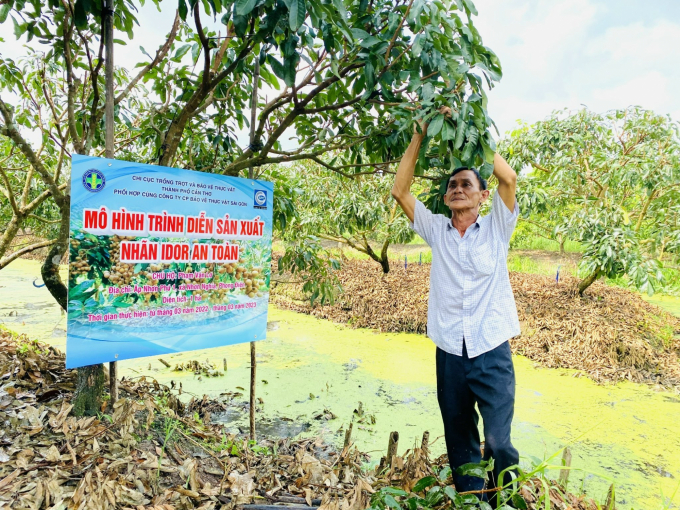
Mr. Pham Van Le, Chairman of the Board of Directors, Director of Nhon Nhia Longan Cooperative, presented a demonstration model of safe label production using bio-fertilizers. Photo: Le Hoang Vu.
The demonstration model of safe Ido longan production in Nhan Nhon Nghia Cooperative is conducted under the auspices of Can Tho Municipal Crop Production and Plant Protection Sub-department and Sai Gon Plant Protection JSC. The cooperative is provided organic fertilizer and biological pesticides by Sai Gon Plant Protection Company to implement the model. Participants are required to attend technical training and are taught how to utilize organic fertilizers and biological pesticides most effectively to cut costs and minimize their reliance on chemical fertilizers and pesticides.
According to Mr. Pham Van Lo, Chairman of the Board of Directors and Director of Nhan Nhon Nhia Cooperative, the cooperative now has 29 members and cultivates more than 22.5 hectares of longan, the majority of which is Ido longan. This longan variety is high yielding and productive, as well as resistant to witches broom virus.
Since almost two years ago, the Cooperative's members have been adhering to the VietGAP standard to provide safe and certified goods. However, due to the reliance on chemical fertilizers and pesticides, production costs have been high, even more so in recent years as chemical fertilizer prices have doubled or tripled.
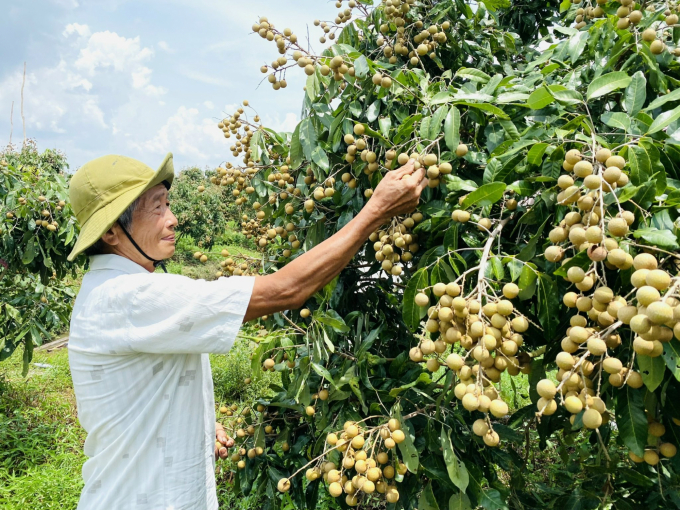
According to farmers' estimates, if production processes are well implemented in the direction of safety and reduction of chemical fertilizers, farmers can reduce production costs by more than 20%. Photo: Ngoc Thang.
As a result, organic fertilizer and biological plant protection agents are becoming more widely adopted since they are both economical and effective. From the use of fertilizers and biological pesticides to the extreme reduction of chemical fertilizers, we are not only lowering production costs but also contributing significantly to product safety.
"It is estimated that if production processes are properly executed with a focus on safety and the elimination of chemical fertilizers, farmers may save more than 20% on production expenses," Pham Van Lo, director of Nhan Nhon Nhia Cooperative, explained.
Demonstration model of safe Ido longan production
- Variety of plants: Ido longan
- Location: Ap Nhon Phu 1 Cooperative, Nhon Nghia commune, Phong Dien district, Can Tho city.
-Duration: March 2022 – March 2023
- Plant protection agents used in the model: Comda gold 5WG
The model was commissioned by the Can Tho Municipal Crop Production and Plant Protection Sub-department under a contract with the Department of Plant Protection (MARD). Not only does the model adhere to the VietGAP standard, but it also retains an emphasis on organic fertilizer and biological plant protection agents in order to minimize the use of chemical pesticides on plants.
Ms. Tran Thi Kim Thuy, Deputy Director of the Can Tho Municipal Crop Productivity and Plant Protection Sub-department, explained that rising input costs have hurt farmers' production and cultivation, as well as profitability.
To assist farmers in lowering production costs, Can Tho city's agricultural sector is proactively cooperating with businesses to assist farmers in implementing an efficient model for employing organic fertilizer and biological plant protection agents to minimize the use of chemical pesticides on plants. As a result, qualified and safe agricultural goods are created in response to market demands.
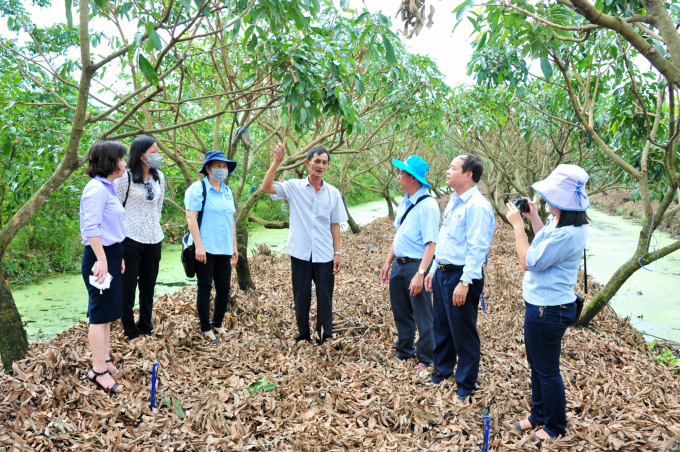
Leaders of the Plant Protection Department and the Cultivation and Plant Protection Sub-Department of Can Tho City came to visit the safe longan growing model of Nhan Nhon Nghia Cooperative. Photo: Le Hoang Vu.
Additionally, the agriculture industry expects and encourages farmers to make a dramatic shift away from conventional agriculture, which relies on chemical fertilizers and pesticides toward biological agriculture in the future.
Ms. Thuy noted that to comply with the agricultural sector's and the Ministry of Agriculture and Rural Development's directions, the Sub-Department is actively assisting farmers in managing pesticide residues, developing models for the use of biological pesticides, and ensuring crop safety. Towards the establishment of specialized manufacturing zones and granting planting area codes so that products meet export standards.
The Can Tho Crop Production and Plant Protection Sub-Department has also worked closely with units and businesses to provide necessary technical assistance, organic fertilizers, and biological pesticides to assist farmers in implementing specific models on a variety of crops, including rice and fruit trees, in an efficient, quality, and export-oriented manner.
The Plant Protection Department is now fostering collaboration with units and enterprises to implement a variety of programs aimed at educating and encouraging people to use organic fertilizers and biological pesticides more often.
Ms. Bui Thanh Huong, Head of the Plant Protection Agents Office (Pesticide Department), stated that the Plant Protection Department has aggressively partnered with local governments and enterprises to coordinate four major components throughout the years. To begin, pesticide sellers, agents, and farmers must get instructions on the safe and effective application of pesticides.
Second, developing models for biological pesticide use, safe and effective pesticide use, and input investment cost reduction. Thirdly, collecting and properly disposing of pesticide packaging to safeguard the environment. Last, developing production of biological pesticides…
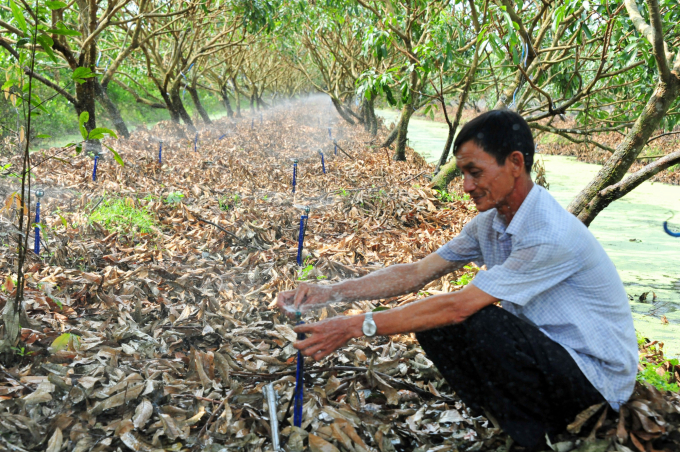
Farmers engaging in a safe longan production model at Nhan Nhon Nghia Cooperative use an automatic sprinkler system. Photo: Ngoc Thang.
Saigon Pesticide Joint Stock Company, a prominent firm in the pesticide manufacturing sector, is paving the way for farmers in the Mekong Delta to get the best biological pesticide products.
Mr. Ha Quy Mai, Deputy Head of Sales Department (Saigon Plant Protection Joint Stock Company), shared that the Company is actively producing and coordinating with farmers and local authorities to promote the introduction of organic fertilizers and biological pesticides to the market, following the State's programs and policies and commitments with the Plant Protection Department.
Simultaneously, collaborate to assist farmers in using pesticides safely, economically, and efficiently, therefore contributing to the development of safe agricultural goods. Over the years, the firm has collaborated with several farmers and members of the agricultural industry in Can Tho to create an organic rice production model for export to discerning markets such as Europe and the United States.
Following the model's success with rice, the business is replicating and assisting longan farmers in Phong Dien district (Can Tho city) in implementing a demonstration model of safe longan production, which is likely to continue. Produce further models for additional crops.
Since mid-2021, the Plant Protection Department has made partnerships with key producers of biological pesticides and collaborated on the development of demonstration models. The goal is to gradually shift people's production mindset away from chemical pesticides and toward biological pesticides.
Until now, the Plant Protection Department has signed agreements with domestic enterprises to implement more than 120 models of biological pesticide use on rice; these models have demonstrated significant success and will be expanded to other crops, according to Mr. Hoang Trung, Plant Protection Department Director.
Translated by Linh Linh
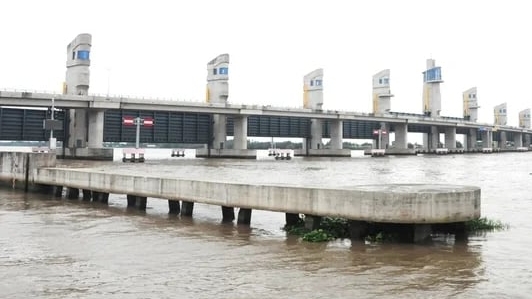
(VAN) Large-scale irrigation projects in the Mekong Delta have safeguarded a beneficiary area spanning more than 1 million hectares, significantly mitigating damage caused by drought and saltwater intrusion.

(VAN) Residents along the south bank of the Hau River are anticipating the Rach Mop lock by the end of 2024, along with projects to fortify the irrigation system to prevent saltwater intrusion.
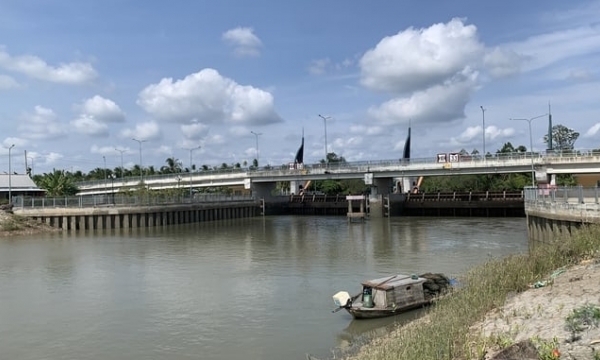
(VAN) The Bong Bot - Tan Dinh sluice delivers fresh water to meet the production demands of thousands residing in Tra Vinh province's coastal areas.
/2024/04/26/0500-3-135847_403.jpg)
(VAN) According to Dr. Dao The Anh, if indigenous varieties that are highly nutritious and adapt to climate change can be developed, the community will greatly benefit.
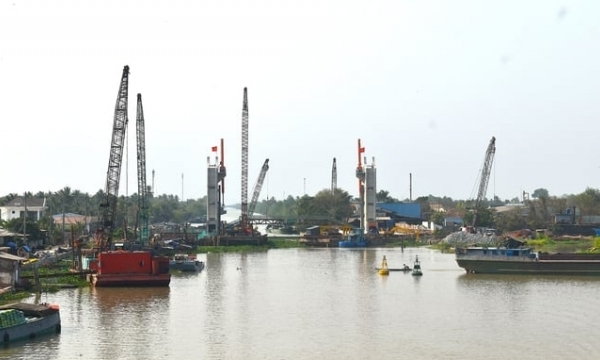
(VAN) The Nguyen Tan Thanh sluice is crucial in preventing salinity and storing freshwater to meet the daily needs of over 1.1 million residents in Tien Giang and Long An provinces.
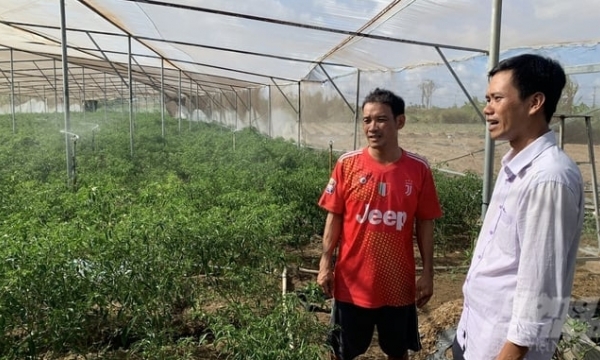
(VAN) The project, sponsored by the European Union, is implemented in Dong Thap, Kien Giang, and Tra Vinh provinces, with a total funding of 4.2 million Euros.
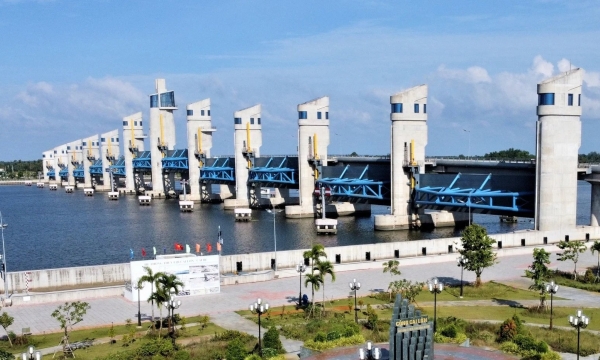
(VAN) In the heart of the Mekong Delta, the Cai Lon and Cai Be sluice gates act as guardians, halting the incursion of salty tides deep into the inland fields and managing freshwater resource distribution.